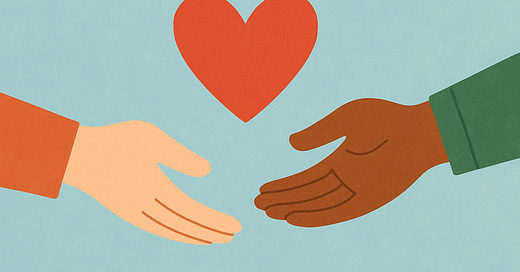"No act of kindness, no matter how small, is ever wasted."
— Aesop
Kindness.
It’s a word we hear often.
A virtue praised,
a quality admired.
And the old saying goes:
“Kindness is free.”
No price tag.
No subscription fee.
No barrier to entry based on
wealth,
status,
or power.
It seems so simple.
So readily available.
A currency everyone possesses,
ready to be spent.
But if it’s truly free,
so abundant,
why isn’t it always
our first resort.
Our default setting?
Why, in a world aching
for connection,
for understanding,
for a little more gentleness,
does kindness sometimes feel
like a scarce resource?
The Hidden Costs (We Imagine)
Maybe the "freeness" of kindness
is deceptive.
Or rather, we perceive costs
that aren't inherent to kindness itself.
Perhaps we fear:
Vulnerability:
That kindness will be mistaken for weakness,
especially in contexts, or within scripts,
that equate strength with hardness,
with a defended posture.
Rejection:
That a kind gesture will be rebuffed,
misunderstood,
or unreciprocated,
leaving us feeling exposed.
Time & Energy:
That being kind requires more
than we have to give,
especially when we're already stretched thin,
running on empty.
(Though often, a kind word takes but a moment).
Being Taken Advantage Of:
The cynical whisper that says,
"If you're too kind, people will walk all over you."
These perceived costs,
these fears,
can become the invisible fences
that keep our innate capacity for kindness
corralled, underused.
But what if the real cost
lies not in offering kindness,
but in withholding it?
Kindness: The Quiet Strength, The Deep Connection
Kindness,
in its truest sense,
isn't just about being "nice."
It isn't about passive agreeability,
or withholding uncomfortable truths
to save face, to avoid friction.
True kindness,
the kind that resonates,
the kind that builds—
builds trust,
builds people,
builds better ways of living—
is an active choice.
A conscious orientation.
A decision to speak truth,
when truth is needed,
but to wrap that truth
in genuine love and care.
It's the courage to challenge directly,
precisely because you care personally.
This is a quiet form of strength.
A profound commitment.
It’s the courage to see another person—
their struggles,
their potential,
their humanity—
even when it’s inconvenient,
even when they are different,
even when delivering a hard message
is the kindest path to their growth.
It’s the wisdom to understand
that our well-being is deeply interwoven
with everything on this planet we call home.
That lifting another—
sometimes through comfort,
sometimes through candid, caring feedback—
often lifts ourselves.
It’s the presence to offer
our full attention,
our genuine listening,
our assumption of good intent
(until proven otherwise).
Sometimes the kindest act
is simply to hear, fully, and
sometimes it's to
share a perspective they need,
but might not want, to hear—
delivered with love, gentleness and respect.
And it begins,
so often,
with kindness towards ourselves.
The grace to forgive
our own stumbles.
The permission to be imperfect.
The self-compassion that refills
the well from which we offer kindness—
both gentle and challenging— to others.
This internal kindness
costs nothing but a shift in perspective.
The Ripple Effect of a "Free" Gift
A single act of kindness,
freely given,
can send ripples outward
in ways we may never fully see.
It can de-escalate tension.
It can open a door for dialogue.
It can mend a small tear
in the fabric of a relationship.
It can offer a moment of solace
to someone carrying a hidden burden.
It doesn't need to be grand.
A patient explanation.
A shared smile.
Holding the door.
Offering help before it's asked for.
Acknowledging someone's effort.
Choosing a gentle word
when a harsh one comes to mind.
These small acts,
these "free" offerings,
accumulate.
They build trust.
They foster goodwill.
They make the spaces we inhabit—
our homes, our workplaces, our communities—
a little warmer,
a little safer,
a little more human.
This isn't about saving the world
with one grand gesture.
It’s about recognizing
the power held in
the simplest,
most accessible human interaction.
Try This: Spending Your Free Currency
This week,
let's make a conscious effort
to "spend" this free currency:
One Act of Self-Kindness:
What’s one way you can be gentler with yourself today?
Forgive a small mistake?
Allow yourself a moment of rest without guilt?Acknowledge something you did well, however minor?
One Outward Gesture (No Grand Plan Needed):
Look for one small opportunity to offer unexpected kindness to another.
A genuine compliment to someone.
Letting someone go ahead of you in line.
Sending a brief, appreciative note to a friend.
Simply offering your full, undistracted attention when someone is speaking to you.
Notice the Shift:
Pay attention to how it feels—
both to offer kindness,
and (if you're on the receiving end)
to receive it.
What changes, however subtly,
in you, or in the interaction?
The Richest Return
Kindness is free.
It costs no money.
It requires no special status.
But its returns?
They are immeasurable.
A deeper sense of connection.
A quieter mind.
A more open heart.
A world that feels,
even in small ways,
a little more hopeful,
a little more humane.
In the grand accounting of a life well-lived,
these "free" acts of kindness
might just be
our most valuable investments,
building the kind of wealth
that truly sustains.
A cornerstone of the new map
we are all trying to draw.



